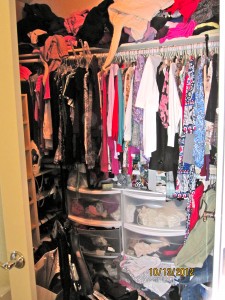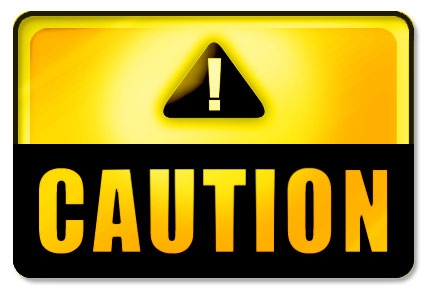Laurie (not her real name), hired me recently to help her organize her overstuffed, clothes closet. It took two days. One day to sort and then edit what she no longer wanted and one day to contain, label and return what was left to her closet, organized, folded, hung right side in, and accessible.
Laurie is an active, super-mom of two school-aged kids, with a full time sales job. She told me she wanted to feel less stressed in the morning which often meant time spent looking for a matched pair of shoes or a clean outfit so she could get herself dressed in time to feed her kids and get them to school before heading to work herself. She confessed her husband was neater than she was and her disorganization was creating friction between them.
This is the type of organizing job that most people think of when I tell them I do residential organizing. In fact, organizing a closet is one of those “dream” assignments that most professional organizers knows comes once in a blue moon.
In general, the people who hire organizing professionals to work in their homes are those who have much bigger challenges.
This is why I silently cringe when I come across people who refer to themselves as a “professional organizer” but have no significant experience working with clients, let alone credentials or training.
In May of next year, the official manual of mental health diagnosis and criteria, otherwise known as the Diagnostic and Statistical Manual (5th edition) or more commonly known in the mental health world as the DSM-V, will be published by the American Psychiatric Association.
The DSM-V contains a listing of diagnostic criteria for every psychiatric disorder recognized by the U.S. healthcare system. Among those conditions expected to be included is “Compulsive Hoarding Disorder” which up till now has been listed as a sub-set of Obsessive Compulsive Disorder (OCD), a serious anxiety disorder involving intrusive thoughts and ritualized behaviors aimed at reducing an individual’s anxiety.
Including Compulsive Hoarding as it’s own condition came out of research that found that people who suffer from this condition, which basically involves the excessive acquisition of items that frequently are perceived by others as having little or no value but lack the ability to discard them, have not responded to treatments used for OCD. In addition, other studies have found that people who compulsively hoard don’t always show other symptoms of OCD.
Even if someone is not disorganized at the level of a “Hoarder” but may be what is termed “Chronically Disorganized,” this doesn’t mean their disorganization can be easily understood or fixed by just having the right containers. There are many factors — situational, emotional or physical– that impact a person’s ability to manage their lives in a reasonably organized way. Disorganization is a symptom but it is also a behavior disorder that can impact a person’s well being, health and safety in very real ways.
For example, I recently worked with a middle-aged woman who was suffering from depression brought on by the death of her father with whom she was very close. Her depression lead her to neglect her home for so long that when I met her she couldn’t access her sink to get fresh water. Her floor was covered with so much clutter that she would have difficulty leaving her home in an emergency. Her bed was piled so high with clothing she slept on her couch.
The Institute for Challenging Disorganization, known in the industry as ICD, is a subscriber organization that provides education and resources to those challenged by disorganization as well professionals working with this population. People with Chronic Disorganization, according to ICD, have a history of disorganization in which “self-help efforts to change have failed, undermining their current quality of life and the expectation of future disorganization.”
People with Chronic Disorganization are often great at keeping their conditions a secret. Such was the case with a client I had who was the picture of professionalism – a 45 year-old sales manager who was the top sales producer at her office but had not invited anyone to her condo in five years because she told me she was “too exhausted to clean up” and hadn’t unpacked since she moved in.
At a time when we have twice as much information coming at us, both digitally and in print, even the most competent person can find themselves challenged to stay on top of it all. Such was the case of an entrepreneur I worked with who could do anything involving technology but when it came to organizing his bills, documents and other paper, he felt like a “lost cause.”
Even people whose lives are relatively stable can be challenged by the enormity of organizing challenges such as the retired widow who hired me to help her fit the contents of her 2,400 square-foot family home she just sold into a 1,600 square-foot city apartment she had rented.
Unfortunately, anyone can call themselves a “professional organizer.” Doing so does not require any type of specialized training, certification or license.
The National Association of Professional Organizers otherwise known as NAPO is the leading professional association for the industry. While their role is not to regulate, they do require that members adhere to an ethical code, and are in the process of developing a basic curriculum that will be required of all members in the coming years.
Professional organizing is a relatively new industry, and NAPO, formed in 1985 and which now includes more than 4,200 members in 12 countries, including the U.S., was formed when people were discovering there was a growing need for help on ways to be more organized and productive at a time when consumerism was at its highest and the information age was just starting to explode.
Fortunately, there is a certification track available through an organization called the Board of Certified Professional Organizers® or BCPO® The BCPO® requires certain experiential standards be met and applicants must pass an exam before they can receive their BCPO® certification. (I am getting ready to sit for my exam in February.)
Although NAPO and the BCPO® are working hard to establish standards for the profession, most consumers are not aware of these standards, nor does the general public necessarily understand the differences between someone who calls themselves a “professional organizer” and one who actually has the credentials, training, experience and education to perform the work at the highest level.
Consumers, whether they be businesses or individuals must rely on the recommendations of others, and their ability to size up the skills and qualifications of the organizer. This means they often have to make an important decision about the kind of help they need from their gut feelings. This wouldn’t be a big problem if what you are looking for is someone to organize your clothes closet but what if, like many people, your disorganization is impacting your well being, health or safety in bigger ways?
As a consumer, I would implore you to consider an organizing specialist the same way you would consider any other professional such as an attorney, dentist, doctor or accountant. Would you feel comfortable hiring a dentist who advertised on a free bulletin board? Would you work with an accountant who you discovered on a flyer tacked to a phone pole? Would you send your parents to seek medical care from someone who had four other jobs?
All I’m saying is, you get what you pay for. In other words, Buyer beware.
Posted by

